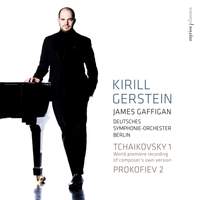Interview,
Kirill Gerstein on Tchaikovsky
 Pianist Kirill Gerstein turned musicologist for his recent release on Myrios Classics - exploring the rarely-heard original version of Tchaikovsky's First Piano Concerto. He reprises this repertoire at the Proms tomorrow - I took the opportunity to ask him about the process behind his rediscovery of Tchaikovsky's ever-popular work.
Pianist Kirill Gerstein turned musicologist for his recent release on Myrios Classics - exploring the rarely-heard original version of Tchaikovsky's First Piano Concerto. He reprises this repertoire at the Proms tomorrow - I took the opportunity to ask him about the process behind his rediscovery of Tchaikovsky's ever-popular work.
Until your recording for Myrios Classics released last year, this version of Tchaikovsky’s First Piano Concerto had probably not been heard publicly since it was performed at the composer’s last concert in 1893 in St Petersburg. Where did the idea come from to bring this version back into the public consciousness?
First of all, I should probably explain that the First Piano Concerto exists in three versions: the first was published in 1875, the second in 1879 and the third, a year after his death in 1894. What I released on Myrios Classics and will be playing at the BBC Proms this summer, is the second and final author’s version. The posthumous version from 1894 contains a number of editorial changes that differ from the text of Tchaikovsky’s score and were not authorized by him.
As for coming to record the second version of work, I had been aware that earlier versions existed but the picture had always been very murky. When I heard that the Tchaikovsky Museum in Klin, which houses his archives, were about to publish a new Urtext edition of the 1879 version, I asked whether I could see the materials they were working from which they were kind enough to send me. As I mention in the accompanying CD booklet, when I learnt about the history of this second version, I thought immediately how odd that in the standard repertory the posthumous version has prevailed over the past hundred years even though it doesn’t reflect Tchaikovsky’s original intentions. On comparing the two versions, it was clear that what Tchaikovsky wrote was much better than what the editors had done to the work after his death.
The Tchaikovsky Museum was also kind enough to allow me to release a recording of the new edition before its publication date last year. Since then, I have been performing this previously unheard version internationally in the hope of shedding a new light on Tchaikovsky and on one of his most well-known works.
Presumably you were already familiar with the 1894 posthumous version of the work which probably continues to be a favourite in the standard repertory. Was a lot of re-adjustment required?
It involved some, of course, because although the second version retains most of the material of the version that we all know today, there are significant differences in the piano part in particular. The whole process of re-learning the work made me think of what it must feel like when restoring old paintings which have been covered in generations of grime.
Have you changed the way you approach the Concerto since your recording of it in early 2015 and have the change in orchestra and conductor affected the way you perform it?
Absolutely - that’s the thing with recordings, they’re only a snapshot, like a photograph of a certain moment in time, and since then, I would have hoped that I’d have developed musically-speaking! Also, I of course now have more experience with this version having performed it in lots of places. However, I think the foundations of my ideas about the piece are still similar, because the piece is like the structure of a building – the walls don’t really move and the proportions remain the same.
How do you think the Proms compare to other classical music festivals around the world?
What’s so unique about the Proms is the passion it generates amongst its public and its sheer reach: the fact that it not only plays to a huge live audience but that it also broadcasts every single performance on the radio. It’s the scale of the passion, the intensity and the high-level of programming which really makes it stand apart from any other festival. What I remember most from the first time I played at the Proms is the visceral impression it left on me: from the moment the door opens for you to step onto the stage, the warmth and energy from the audience rushes towards you.
Kirill Gerstein's recording of Tchaikovsky's Piano Concerto (with the Deutsches Symphonie-Orchester Berlin under James Gaffigan) was released last February on Myrios.
Available Formats: SACD, MP3, FLAC, Hi-Res FLAC



